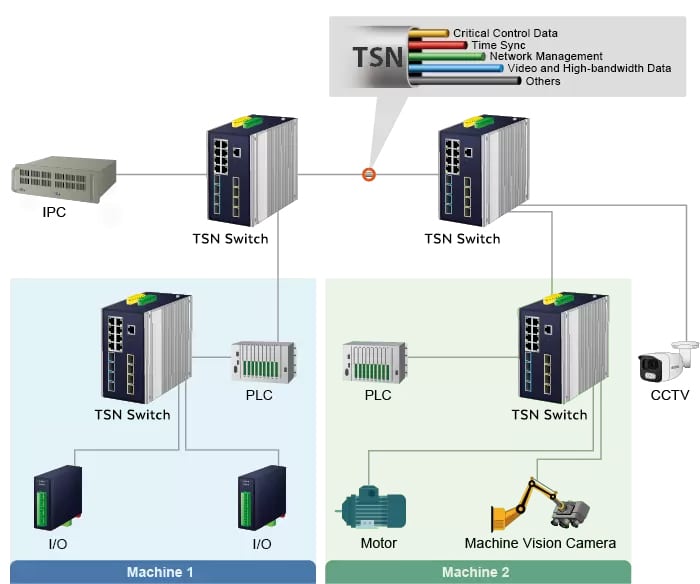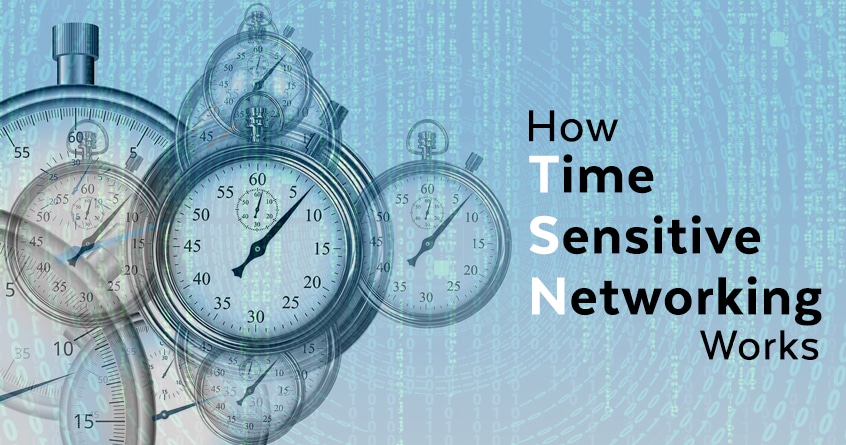Is your business struggling with slow network speeds and inconsistent data transfer? Time Sensitive Networking (TSN) technology may be the solution you need. TSN is a set of IEEE standards and technologies that enable real-time communication and data transfer over Ethernet networks.
This blog post will delve deeper into TSN technology, its benefits, and how it works. By the end of this article, you’ll better understand how TSN technology can improve your network infrastructure and help you achieve your business goals. Let’s get started!
What is Time Sensitive Networking (TSN) Technology?
TSN is a set of IEEE standards and technologies that enable real-time communication and data transfer over Ethernet networks. TSN technology provides critical control data, time synchronization, video, and high-bandwidth data transfer with stringent timing and delivery requirements.
TSN technology is instrumental in manufacturing floors, where precise coordination of machines and processes is essential. Studies have revealed that the time-sensitive networking industry is on the verge of exponential growth, with an expected valuation of over $1.1 billion by 2026.
Such an optimistic projection indicates that the demand for TSN technology is growing rapidly, and businesses must adapt to these changes to remain competitive. But how does this technology work?
How TSN Technology Works
TSN technology implements a set of IEEE standards and technologies allowing real-time communication and data transfer over Ethernet networks. Here are some key points on how TSN technology works:
- Time synchronization: TSN technology enables precise time synchronization across all devices on a network. This ensures data is transmitted and received when needed, making it ideal for time-critical applications such as industrial control systems.
- Scheduled traffic: TSN technology allows for the prioritization of traffic, ensuring that time-critical data is given priority over non-time-sensitive data. This is accomplished using traffic scheduling mechanisms such as IEEE 802.1Qbv, which enables the transmission of scheduled traffic with extremely low latency.
- Frame preemption: TSN technology uses frame preemption mechanisms such as IEEE 802.1Qbu to ensure that time-critical data can preempt lower-priority traffic. This helps prevent data delays and ensures you transmit critical information on time.
- Stream reservation: TSN technology allows reserving network resources for specific data streams, ensuring they receive the required bandwidth and resources. This is accomplished through mechanisms such as IEEE 802.1Qcc, which enables per-stream traffic shaping and reservation.
 The Benefits of TSN Technology
The Benefits of TSN Technology
TSN technology benefits businesses and organizations that rely heavily on real-time communication and data transfer. Here are some of the main benefits of implementing TSN technology:
1. Enhanced Network Performance
TSN technology provides critical control data, time synchronization, video and high bandwidth data, and other requirements for data-heavy industrial scenarios. By prioritizing and managing network traffic, TSN technology can ensure that time-critical data is delivered accurately and on time. At the same time, lower-priority data can be handled on a best-effort basis.
2. Reduced Latency
With TSN technology, you can reduce network latency. Latency is the time it takes for data to travel from one point to another across a network. In time-sensitive applications, such as real-time control systems or video streaming, even minor delays can cause significant problems. TSN technology helps to ensure that data is delivered with minimal latency, providing a more seamless user experience.
3. Improved Scalability
As the number of devices connected to a network grows, managing traffic and maintaining performance becomes difficult. TSN technology can help you alleviate this problem by providing a standardized method for prioritizing and managing network traffic. By ensuring that time-critical data is delivered first, TSN technology can help to prevent network congestion and ensure that all devices on the network have the capacity they need.
4. Interoperability
TSN technology is based on IEEE standards and is interoperable across different vendors and devices. This can be particularly important in industrial applications, where devices from other manufacturers must work together seamlessly. By providing a standardized way to manage network traffic, TSN technology can ensure that devices from different vendors communicate effectively and reliably.
 5. Cost-Effective
5. Cost-Effective
Implementing TSN technology can be cost-effective in improving network performance and reliability. By prioritizing and managing network traffic, TSN technology can ensure that time-critical data is delivered accurately and on time. At the same time, lower-priority data can be handled on a best-effort basis. This can reduce the need for expensive network upgrades and ensure that existing network infrastructure can be used more efficiently.
IEEE Standards and Technologies Involved in TSN Functionality
TSN functionality involves several IEEE standards and technologies crucial for managing critical control data, high bandwidth data, and video transmission in demanding industrial scenarios. Here are some of the most important standards and technologies involved:
- IEEE 802.1AS-REV time synchronization: This standard ensures that all nodes in the network have synchronized time so they can communicate seamlessly.
- IEEE 802.1Qbu frame preemption: This standard enables high-priority traffic to interrupt and take over the transmission of low-priority traffic to ensure the timely delivery of time-critical data.
- IEEE 802.1CB redundancy elimination: This standard eliminates the redundant transmission of data packets to improve network efficiency and reduce latency.
- IEEE 802.1Qbv scheduled traffic enhancement: This standard ensures that time-critical traffic is transmitted at the right time and with the highest priority.
- IEEE 802.1Qci per-stream filtering: This standard enables filtering of network traffic on a per-stream basis to ensure that each stream receives the proper priority and bandwidth allocation.
Wrapping Up
Time Sensitive Networking provides critical control data, time synchronization, video and high-bandwidth data, and other requirements for demanding industrial scenarios. TSN technology offers instantaneous, seamless audio and video communication, enhanced security features, and accurate data transfer. By understanding TSN technology and its capabilities, IT professionals and businesses can advance their networks and achieve greater efficiency.
Versa Technology, Inc. is a U.S.-based provider of last-mile IT networking technology and one of the most well-established Power over Ethernet (PoE) switch technology product suppliers. Contact us for more details about our products and services.

